- Home
- Policies
- Policy Index
- Connected Industries
- Ouranos Ecosystem
Ouranos Ecosystem
The Ministry of Economy, Trade and Industry (METI), together with the related ministries and agency, the Digital Architecture Design Center (DADC) under the Information Processing Promotion Agency (IPA), and the New Energy and Industrial Technology Development Organization (NEDO), has been working on designing, researching and developing, demonstrating, implementing, and establishing architecture of mechanisms for sharing multiple data processing systems operated and managed by various stakeholders. METI hereby announces that we have named these initiatives for interoperable data infrastructures “Ouranos Ecosystem.”
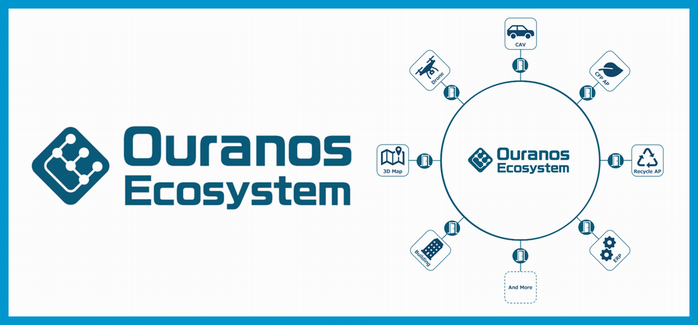
Guideline
Based on the technical reference document "Whitepaper: Ouranos Ecosystem Data Spaces Reference Architecture Model (ODS-RAM)" published in collaboration with IPA, we will advance social implementation targeting specific use cases, aiming for further expansion of the Ouranos Ecosystem, using the reference architecture model presented in the ODS-RAM as a foundation.
Whitepaper: Ouranos Ecosystem Dataspaces Reference Architecture Model (ODS-RAM)
Digital Architecture Design Center of Information-Technology Promotion Agency, Japan, and Ministry of Economy, Trade and Industry, Japan has jointly published a technical reference document for the initiatives of Ouranos Ecosystem, namely "Whitepaper: Ouranos Ecosystem Dataspaces Reference Architecture Model." The whitepaper serves as a reference architecture for enterprise data interoperability and utilization across companies, industries, and nations, presenting the technical paradigm, including the hierarchical structure model of dataspaces, and future perspectives for participants in the Ouranos Ecosystem Dataspaces-dataspaces promoted by the Ouranos Ecosystem Initiative. This document provides open opportunities for the construction of service-driven dataspace, aiming for the Ouranos Ecosystem to become widely integrated within the industry.
- Ouranos Ecosystem Dataspaces Reference Architecture Model

- Ouranos Ecosystem Dataspaces Reference Architecture Model (Summary)

- Whitepaper: Ouranos Ecosystem Dataspaces Reference Architecture Model

- Ouranos Ecosystem Dataspaces OSS (in Japanese)

Guidelines on Data Integration Mechanisms in Supply Chains (for Battery CFP/DD)
These guidelines describe the design principles and basic policies for Interoperable Data Infrastructure that shares and utilizes data across companies, industries, and borders to achieve economic growth by solving social issues and transforming industrial structures, as well as the functions to be provided in a system based on these principles, using the traceability management of storage batteries in automobiles as an example of a leading use case.
Study Group
The Ouranos Ecosystem Trust Study Group
The Ministry of Economy, Trade and Industry (METI) organized a study group on trust required for the secure and trustworthy sharing and utilization of data toward the expansion of the Ouranos Ecosystem and compiled a report on the findings.
- The Ouranos Ecosystem Trust Study Group : Full report(PDF:3,757KB)

- The Ouranos Ecosystem Trust Study Group : Outline of the report(PDF:1,126KB)

- Report Compiled on Trust Required for Promoting Industrial Data Sharing in the Ouranos Ecosystem (March 28, 2025)
Project Certification of Ouranos Ecosystem
The Ministry of Economy, Trade and Industry (METI), together with the related ministries and agency, the Digital Architecture Design Center (DADC) under the Information Processing Promotion Agency (IPA), and other agencies, has been promoting the Ouranos Ecosystem, a cross-border initiative for interoperable data and system infrastructures among companies and industries. The aim is to achieve economic growth through innovation while addressing social issues, such as labor shortages, intensifying natural disasters, and the transition to a decarbonized society.
As Japan’s Ouranos Ecosystem are still in their early stage, METI has established the Project Certification of Ouranos Ecosystem and opened a call for outstanding initiatives that can serve as models for expanding business participation in cross-sectoral data sharing and for developing new cross-sectoral data sharing initiatives. This call is also intended to recognize and encourage best practices in such data sharing. This certification is designed to select outstanding initiatives and use cases that align with the principle of the Ouranos Ecosystem: “Facilitating interoperable data sharing across different businesses through open data spaces, where data controllability and diversity in the services used by participants are ensured.” Projects are selected under two categories: Ouranos Ecosystem Leading Project for initiatives that already provide data sharing functions as production services, and Ouranos Ecosystem Challenge Project for those aiming to provide such functions as services in the future.
Selected projects
Ouranos Ecosystem Leading Project
- Data sharing project on carbon footprint and due diligence across automotive and battery supply chains Project Owner:
- Automotive and Battery Traceability Center Association, Inc. (ABtC)
- Project overview:
- This project aims to achieve secure sharing of carbon footprint (CFP) and due diligence (DD) data across supply chains, while aligning with the EU Battery Regulation.
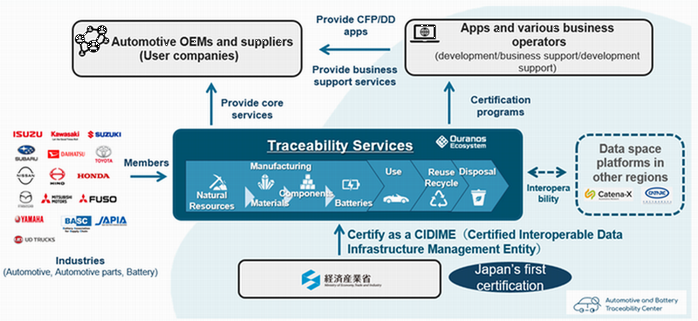
Electricity usage data sharing project
- Project Owner:
- Secured Meter Data Sharing Association
- Project overview:
- This project collects electricity usage data generated every 30 minutes by about 80 million smart meters nationwide from transmission system operators (data provider members) and provides it to the association’s data user members. The data collected and provided in this process includes electricity consumption data, electricity feed-in records, and foundational data used in electricity trading.
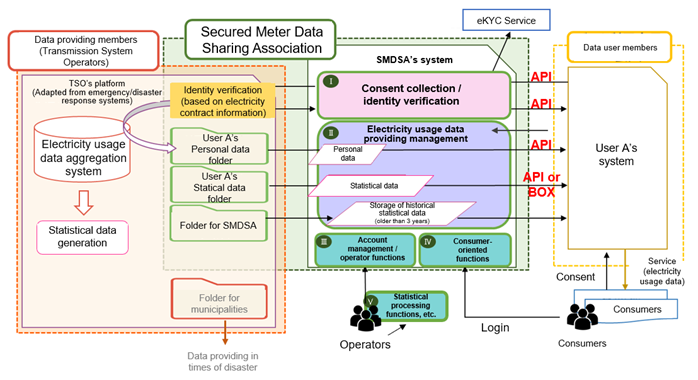
Ouranos Ecosystem Challenge Project
Chemical and Circular Management Platform Project
- Project Owner:
- CMP Task Force
- Project overview:
- This project aims to facilitate the sharing of information regarding chemical substances contained in products (material information and chemical substance information) across the supply chain, enabling a swift response to chemical regulations such as REACH, while also promoting the effective utilization of this information.
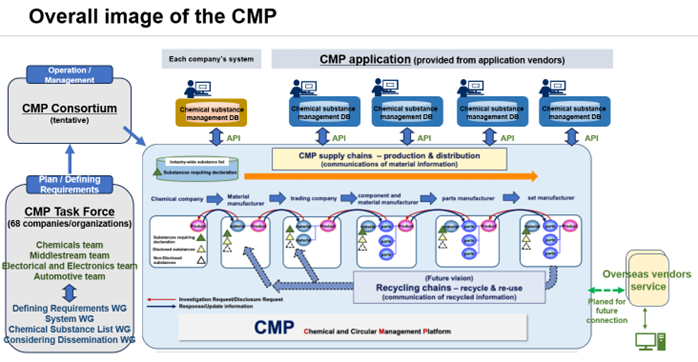
Automotive LCA Platform Project
- Project Owner:
- Automotive and Battery Traceability Center Association, Inc. (ABtC)
- Project overview:
- This project aims to quantitatively assess CO2 emissions throughout the entire lifecycle by promoting data sharing across supply chain companies.
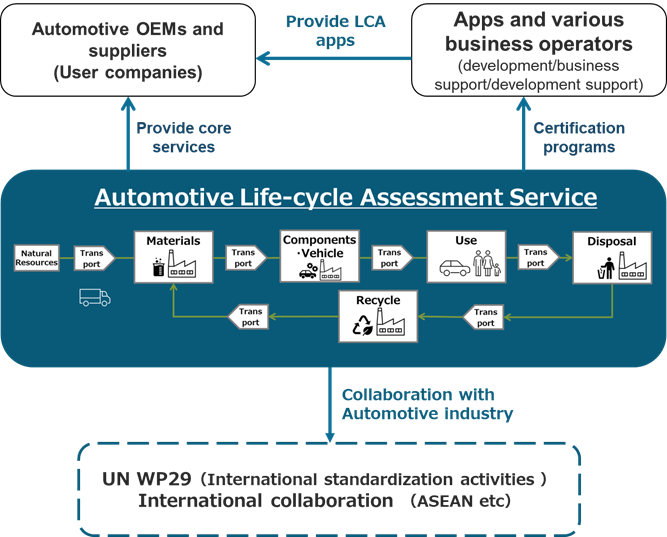
Related Link
Divisions in Charge
Digital Economy Division, Commerce and Information Policy BureauLast updated:2025-10-14